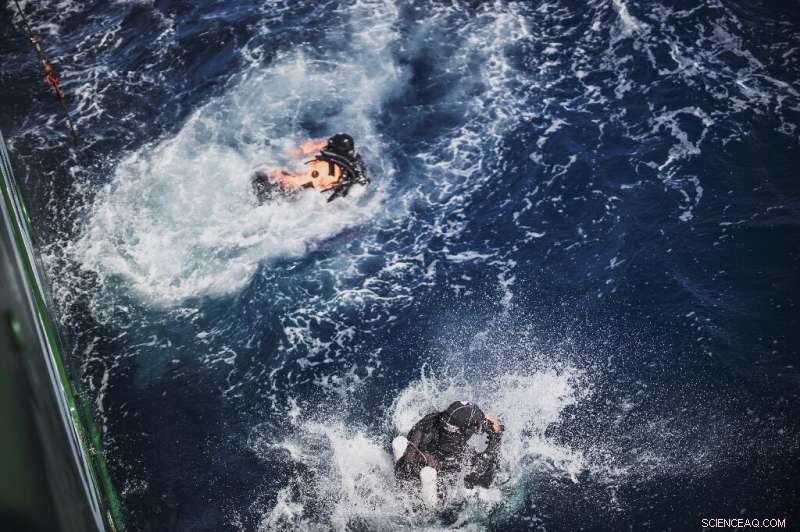
Um respingo maior:os mergulhadores começam a explorar o monte submarino de Vema
Vestidos com equipamento de mergulho ou lonas e gumboots, uma equipe de cientistas e ativistas passou semanas no Atlântico Sul, resistir a tempestades e mar agitado para verificar um lugar do qual quase ninguém ouviu falar.
A missão deles:monitorar uma montanha subaquática em busca de indícios do aquecimento global e da poluição por plástico - e examinar o impacto da proibição da pesca de arrasto há 12 anos.
Pesquisadores do Greenpeace navegaram mil quilômetros (600 milhas) a noroeste da Cidade do Cabo até Vema Seamount, um dos mais notáveis, ainda pouco conhecido, características do Planeta Azul.
A montanha vulcânica sobe um colossal 4, 600 metros (15, 000 pés) do abismo do oceano - quase tão alto quanto o Monte Branco, o ponto mais alto da Europa.
Seu pico cônico, erodido a um topo plano por ondas ao longo de milhares de anos, atinge apenas 26 metros (85 pés) da superfície.
Jornalistas da AFP juntaram-se à 30 tripulação, cientistas e ativistas por 10 dias de sua exploração de três semanas.
A bordo do navio de pesquisa Arctic Sunrise, mergulhadores especialistas compartilharam piadas enquanto vestiam ternos secos laranja e pretos brilhantes, amarrado em cilindros de ar e passou por verificações finais de câmeras de alta resolução.
Eles pularam pela porta do piloto, desaparecendo nas águas azuis profundas por cerca de 45 minutos - um ritual duas vezes ao dia, se o tempo permitir.
Abaixo das ondas, os mergulhadores coletaram amostras e registraram um inventário da vida marinha.
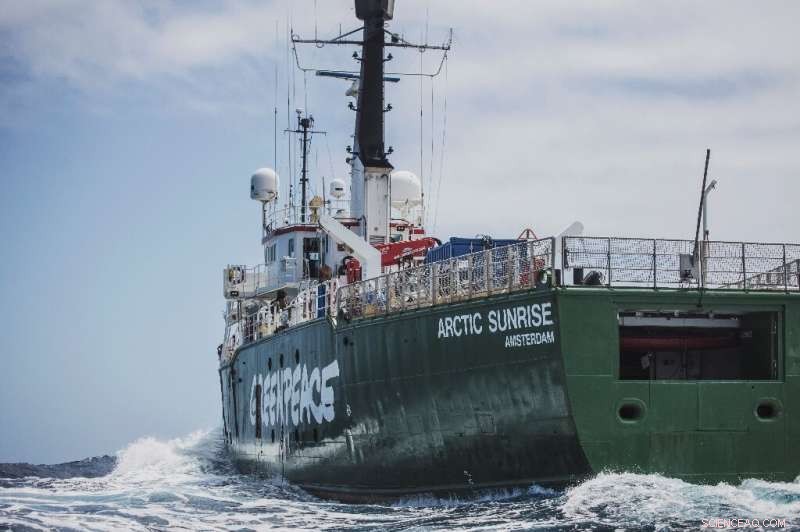
The Arctic Sunrise, um quebra-gelo de 45 metros (147 pés) de construção norueguesa
Paraíso do oceano
Vema é um oásis oceânico - seu cume raso é banhado pela luz do sol, habilitando algas, algas e coral negro para crescer, que por sua vez atraem peixes e crustáceos.
Os mergulhadores ressurgiram, exaltado.
"Havia muitos peixes ao nosso redor, apenas nadando ao nosso redor, em um grande círculo. Foi absolutamente incrível de ver. Lindo! ", Disse o mergulhador holandês Sander Jansson.
Vema - que leva o nome de um navio que o descobriu na década de 1950 - fica em águas internacionais.
Pouco mais de um por cento das áreas oceânicas situadas fora das jurisdições nacionais se beneficiam de alguma forma de proteção internacional, de acordo com o site Ocean Action da ONU.
Vema tem a sorte de ser uma das poucas áreas de alto mar que possui tal escudo.
Em 2007, uma ciência pesqueira intergovernamental e órgão de gestão, a Organização das Pescarias do Atlântico Sudeste (SEAFO) proibiu a pesca de arrasto de fundo em Vema e outros montes submarinos.

O biólogo marinho Thilo Maack informa a equipe do Greenpeace sobre o Monte Submarino de Vema. A área parece estar se recuperando da pesca excessiva, mas como os mares em todos os lugares estão sendo atingidos pelo aquecimento global
Algumas das espécies em Vema claramente floresceram desde então.
"Há tanta vida lá embaixo, "disse o biólogo marinho e líder da expedição Thilo Maack.
"Tem lagostim, há muitas algas marinhas, tem muitas esponjas e peixes de todo tipo ”.
Ele acrescentou:"Este é apenas um exemplo perfeito do que acontece se deixarmos a natureza por conta própria por um determinado período de tempo, mesmo que ela seja sobrepesca, vai reabastecer ".
A perspectiva mais ensolarada se estende até mesmo à lagosta rochosa de Tristan - uma espécie que foi duas vezes levada à quase extinção para atender à demanda de frutos do mar no Leste Asiático.
"Quem disse que não há lagostas lá?" zombou o mergulhador alemão Pascal van Erp ao voltar ao convés após seu primeiro mergulho.
Quando a corrente era muito forte para os mergulhadores entrarem na água, the researchers launched an underwater drone and sat inside a blue shipping container on the ship's deck, monitoring screens sending back video footage.
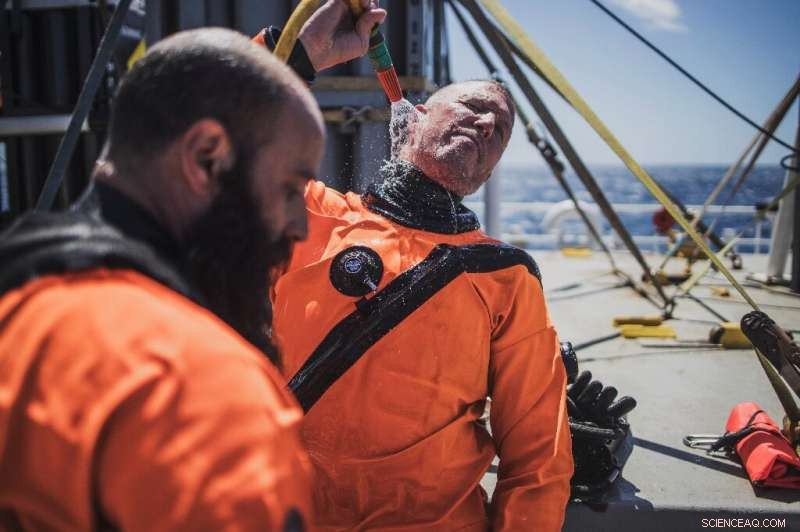
Divers rinse themselves with clean water after a dive to the seamount
Need for protection
Marine conservation organisations are pushing for ocean havens to be vastly expanded.
Greenpeace has mounted a pole-to-pole Arctic-to-Antarctic expedition to lobby the UN to come up with an international legally-binding treaty that protect at least 30 percent of the world's deep oceans from human activities and industrial fishing by 2030.
The UN is negotiating new policies and these which should be finalised at a global conference early next year.
Francois Engelbrecht, professor of climatology at South Africa's University of the Witswatersrand, said the plight of the oceans was like the fight against climate change—both had to be addressed at a planetary level.
"The entire Earth system is connected, it is a coupled system, and changes in one part of the world sooner or later affect many other parts of the world, " ele disse.
"So the international efforts to protect the oceans and to mitigate climate change are in fact an effort that requires tremendous international cooperation."
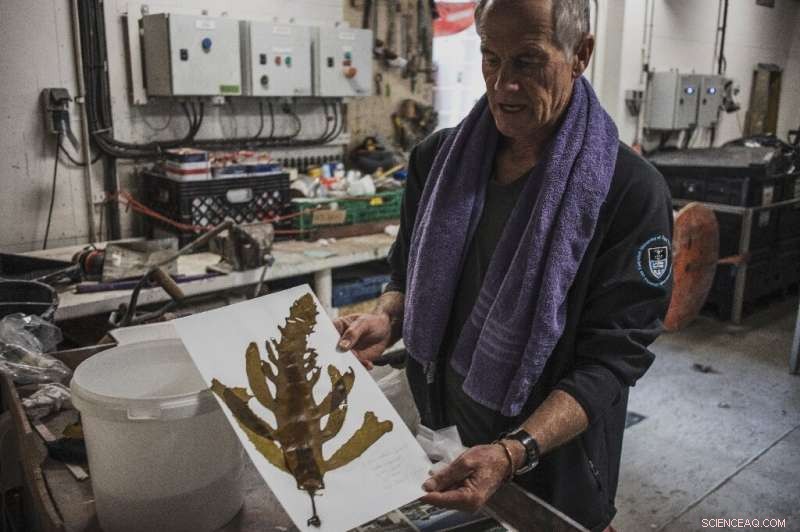
Marine biologist Robert Anderson prepares kelp samples for drying and analysis
Climate peril
The oceans play a vital role in the grim calculus of global warming.
They are, ao mesmo tempo, a shield against warming, a future accelerator of it and a victim of it.
By absorbing a quarter of manmade carbon dioxide (CO2) and more than 90 percent of the heat generated by greenhouse gases, oceans avoid huge amounts of atmospheric warming, says the UN's top scientific panel, the Intergovernmental Panel for Climate Change (IPCC).
But warmer oceans means rising sea levels, as well as stored heat that will ultimately be released to the atmosphere—climate-altering mechanisms that may function for centuries to come.
"A breakdown in climate will ultimately impact on our oceans, " Bukelwa Nzimande, 29, a South African activist.
"They act as carbon sinks, they hold lots of wildlife which captures the carbon, at the same time they absorb excess heat that would ideally be felt by us as humanity."
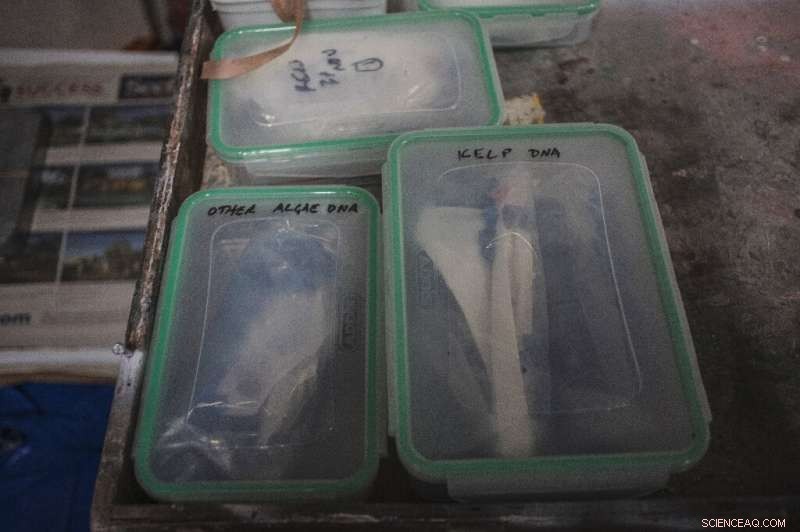
Samples are logged and stored for scrutiny in the lab
Higher sea temperatures and acidification caused by CO2 absorption are widely feared because of their impact on marine biodiversity, although this remains poorly understood.
One of the tasks at Vema was to look for evidence of whale migration and compare that with past years.
By comparing patterns of migration times, scientist hoped to make deductions over any changes to currents and feeding grounds.
Another priority was to look for discarded plastic, which is emerging as one of the biggest threats to marine wildlife.
Plastic bags can be swallowed by marine mammals, and small species absorb minute plastic particles that then accumulate up the food chain.
The UN estimates that 640, 000 tonnes of fishing equipment is discarded around the oceans each year.
Despite the general pristine state of Vema and the ban on fishing, there was evidence that fishing had taken place at Vema.
Divers found a lobster pot and video footage from a drone showed pieces of abandoned fishing nets, known as ghost gear.
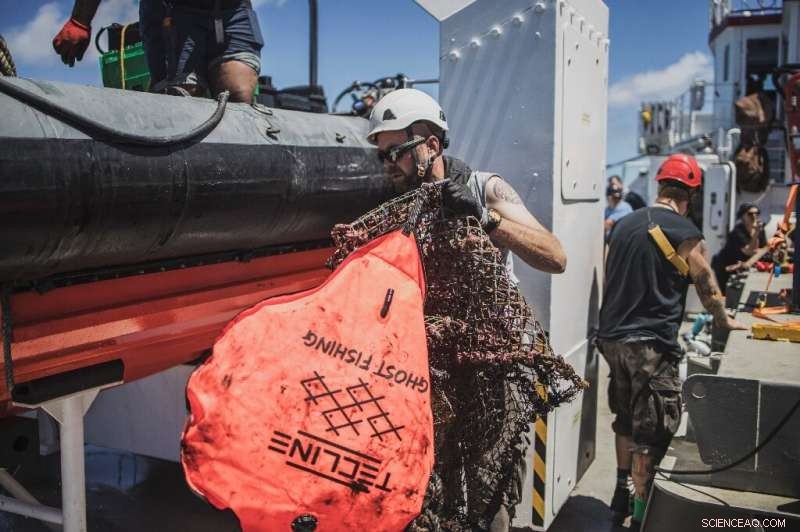
Ghost hunt:A Greenpeace crew member retrieves a device to identify abandoned nets and other fishing equipment. 'Ghost gear' is a major hazard for marine life
Life at sea
There were more than 30 crew, scientists and activists aboard the Arctic Sunrise, a 45-metre (147-feet) Norwegian-built ice breaker.
They hailed from South Africa, Alemanha, Holanda, Belgium and Britain, among other nations.
They shared small cabins equiped with bunk beds, complete with guard rails for the stormy days when the ship swayed violently from side to side.
"Even if my employer today says there's no more money to pay me a salary, I will continue doing what I'm doing, " said deckhand Barry Joubert, 39, who quit his job at a game reserve in Parys, South Africa five years ago to join Greenpeace.
South African-born captain Mike Fincken, 55, spends six months of the year away from his seven-year-old son in Wales.
One of his deck assistants is Tuleka Zuma, a 31-year-old mother of an 18-month-old toddler back in South Africa's southeastern KwaZulu-Natal province.
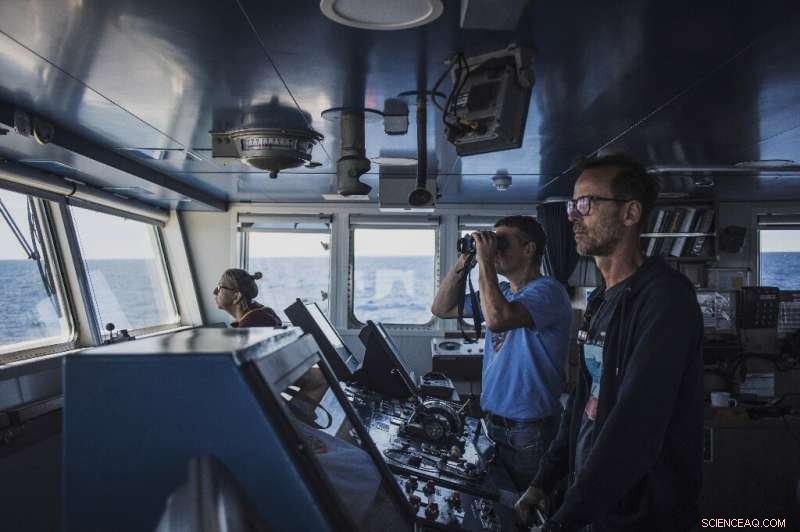
View from the bridge:Captain Mike Finchen, right, and marine biologist Thilo Maack, looking through binoculars
Celine Desvachez, a 27-year-old Belgian boat pilot, said she cannot "find any meaningful way of living my life" other than doing what she did.
"Actually my personal battle is when I go off the ship, " ela disse.
© 2019 AFP